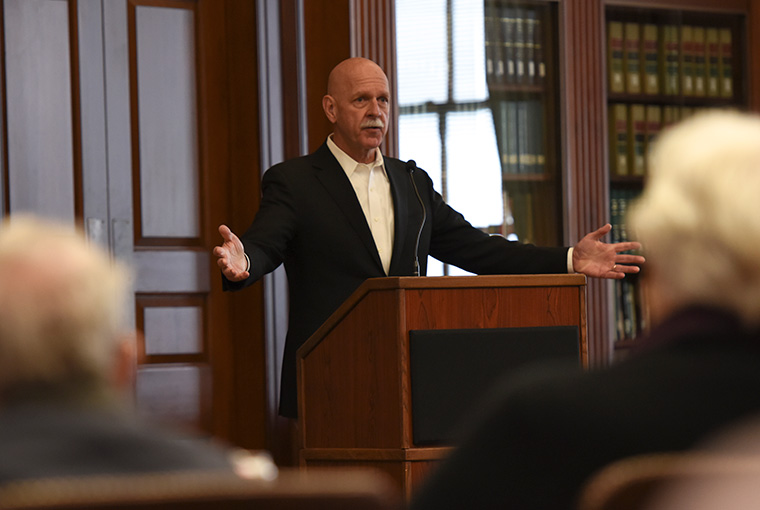Cyber and Innovation Policy Institute holds 1st war game with unique twist

NEWPORT, R.I. -- More than 70 academics, students and military thinkers gathered at U.S. Naval War College on Nov. 16 to participate in the first war game put on by the college’s new Cyber and Innovation Policy Institute.
It was unique for a cyber event. The game was less about how operations occur in cyberspace and more about examining how people react in a crisis that includes cyberspace threats, organizers said.
Also, the contents were at an unclassified level, rare for a cyber war game, and the event included a wide variety of players, including members of the Naval War College Foundation and students from Newport’s Salve Regina University.
“This game is really designed to understand the link between cyber, conventional and nuclear military operations,” said retired Adm. Scott Swift, the event’s keynote speaker.
“It’s not about cyber operations and how those operations affect cyberspace, but instead why and when cyber operations matter to strategic choices that are made outside of the cyber domain,” said Swift, a former U.S. Pacific Fleet commander who is now a fellow at the Massachusetts Institute of Technology.
The players were given a fictional scenario in which a neighboring country invaded a contested border region.
Cyberattacks played a role, and nuclear weapons were a factor. Participants in the breakout groups were assigned to act as cabinet members.
Jacquelyn Schneider, assistant professor in the Strategic and Operational Research Department, was the lead organizer. Her work at the college focuses on political psychology and how technology affects the human dimension of decision-making.
“This is the very beginning of a project that explores not just decisions in crises but experiments with different types of war games,” Schneider said.
“This looks at how does cyberspace interact with the really high-end levers of national power, and then how does that affect, on the macro level, the chance that states end up going to war and the types of war they fight,” she said.
The goal is to publish the findings later in an academic journal, organizers said.
Schneider and her colleagues plan to hold similar events in the future at other institutions.
These war games support the overall focus of the new cyber institute, which was established in August. The institute aims to work at the cutting edge of research, education and fleet support on cyber innovation issues.
“We’re very busy this academic year,” said Peter Dombrowski, director of the cyber institute and a professor in the Strategic and Operational Research Department.
Future events include a gathering of U.S. service academies and war colleges to discuss how cyber studies fit into the future of education.
In an effort to bring the private and public sectors together, the institute will hold a summer war game looking at cyber and financial services.
“We have a mandate to do innovation, cyber and practical research for the Navy,” Dombrowski said. “And we also have a mandate to help inform the public, to support naval education and to develop new research methodologies.”
